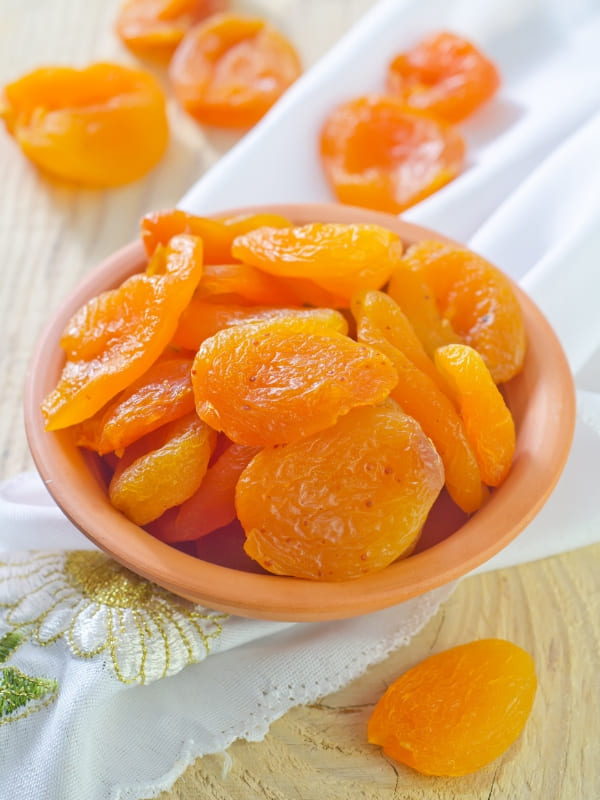Winter months can often leave us feeling sluggish and under the weather. The dry air and cold temperatures tend to drain our energy, leaving our skin dry, our digestion sluggish, and our immunity weakened.
But there’s an easy and delicious way to keep your body in tip-top shape during these cold months – eating dried apricots.
These small golden fruits are packed with essential nutrients that can help keep your skin glowing, support your immune system, aid digestion, and boost your overall vitality.
#1. Glowing Skin and Healthy Hair
Winter can be harsh on your skin, often leaving it dry and flaky. 100 grams of dried apricots contain about 1,100 IU of Vitamin A, which supports skin health and cell turnover.
The beta-carotene in these fruits is converted into Vitamin A in the body, which plays a crucial role in maintaining skin hydration and elasticity and reducing the appearance of fine lines.
A 2022 study found that the antioxidants in dried apricots help protect the skin from UV damage, while Vitamin A improves skin health by boosting collagen production. This helps keep your skin glowing and youthful even in the dry winter air.

#2. Enhanced Immunity Against Winter Illnesses
The cold winter months are synonymous with colds and flu. Thankfully, dried apricots are rich in Vitamin C, a key nutrient that supports the immune system.
100 grams of dried apricots provide around 10 mg of Vitamin C, about 16% of the recommended daily intake. Vitamin C is essential in boosting the production of white blood cells, which defend the body against infections.
Additionally, dried apricots contain iron and potassium, which help keep your blood healthy and improve overall energy levels.
A 2022 study showed that dried apricots’ rich antioxidant, anti-inflammatory, and antiviral properties can significantly enhance immune function, reducing the risk of infections during the cold season.
#3. Natural Digestive Aid
The fiber content in dried apricots makes them an excellent choice for promoting healthy digestion.
During winter, physical activity tends to decrease, which can lead to digestive problems like constipation. The soluble and insoluble fiber in dried apricots helps regulate bowel movements, reduce bloating, and maintain gut health.
Dried apricots act as a natural laxative, improving gut motility and helping prevent constipation, a common issue during the colder months when people tend to consume heavier meals and move less.

#4. Maintaining Body Warmth and Energy
Dried apricots provide a natural energy source that helps keep you warm and active during the winter months. 100 grams of dried apricots contain around 250 calories and 63 grams of carbohydrates.
They are also rich in natural sugars like glucose and fructose, which offer a quick energy boost. This slow-release energy is essential for maintaining your stamina throughout the day.
Dried apricots’ natural sugars provide a steady energy supply, preventing the blood sugar spikes and crashes associated with processed sugars, making them an excellent choice for keeping your energy levels consistent throughout the day.
#5. Protecting Eye Health from Winter Strain
Winter glare and increased screen time can put a strain on your eyes. Dried apricots, rich in lutein, zeaxanthin, and beta-carotene, help protect your eyes by reducing oxidative stress and maintaining healthy vision.
These nutrients help absorb harmful light and prevent age-related macular degeneration.
The antioxidants in dried apricots protect the retina and reduce the risk of cataracts, improving long-term eye health, especially during winter when glare and dryness affect vision.

#6. Supports Bone Health
Dried apricots are an excellent source of calcium (45 mg per 100 grams) and magnesium (30 mg per 100 grams), which are both essential for strong bones.
During the winter months, when people tend to spend more time indoors and may have limited sun exposure, it’s crucial to get enough calcium and magnesium to support bone health and prevent osteoporosis.
Dried apricots’ calcium and magnesium content helps support bone density and prevent bone loss, which is especially important as we age.
A study published in Nutrition Research Reviews highlights the importance of these minerals for maintaining bone strength.
#7. A Natural Source of Hydration
Dried apricots are naturally hydrating, with a significant amount of water retained in the dried fruit. Hydration is key to maintaining energy levels, preventing dry skin, and supporting overall bodily functions during the winter months.
The high potassium content in dried apricots (1,160 mg per 100 grams) supports electrolyte balance, ensuring proper hydration levels, which is especially important in colder months when dehydration can often go unnoticed.

How to Incorporate Dried Apricots into Your Winter Diet
- Snack on them: A handful of dried apricots makes for an easy and nutritious snack.
- Add to smoothies: Blend dried apricots with yogurt, berries, and almond milk for a nutrient-packed smoothie.
- Include in baked goods: Add dried apricots to muffins, cookies, or granola bars for added flavor and nutrition.
- Toss into salads: Rehydrate dried apricots and add them to your winter salads for a sweet and savory touch.
- Mix in oatmeal: Stir dried apricots into your morning oatmeal for a healthy and filling breakfast.

Cautions and Precautions
While dried apricots are a healthy addition to your diet, it’s important to consume them in moderation due to their high natural sugar content.
Eating too many can lead to digestive discomfort or spikes in blood sugar. Be sure to drink plenty of water to stay hydrated, as dried apricots can have a dehydrating effect if consumed in excess.
If you have any allergies to dried fruits, it’s advisable to consult a healthcare professional before incorporating them into your diet.
Disclaimer
This article is for informational purposes only and is not intended as a substitute for professional medical advice.
Always consult with a healthcare provider or nutritionist before making significant changes to your diet, particularly if you have any preexisting health conditions or are taking medication.

How Eating Dried Apricots This Winter Can Keep You Energized and Healthy
